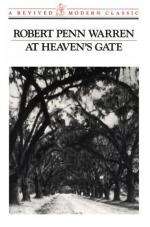|
This section contains 283 words (approx. 1 page at 300 words per page) |

|
The novel makes some use of literary allusion, not only in its title, which is taken from Shakespeare. Warren abandoned his original title And Pastures New (from Milton) because the Shakespeare tide seemed to suggest a more ironic and tragic work. Slim Sarrett, a bisexual literary opportunist who deceives all in the early sections and works a major deception on Sue before murdering her, is attracted to Elizabethan and Jacobean drama, and he sometimes appears to be a character drawn from John Marston (1574-1634) or John Webster (1580?1652?).
Indeed, Sarrett's sarcasm and cynical opportunism are reminiscent of courtiers in a Jacobean melodrama, like Marston's The Malcontent (1602-1604). Yet in his descent into violence with the murder of Sue, Sarrett suggests parallels with one of Webster's disillusioned villains, such as Flamineo in The White Devil (1609-1612) or Bosola in The Duchess of Malfi (c. 1613).
Warren's use of multiple protagonists, especially...
|
This section contains 283 words (approx. 1 page at 300 words per page) |

|




